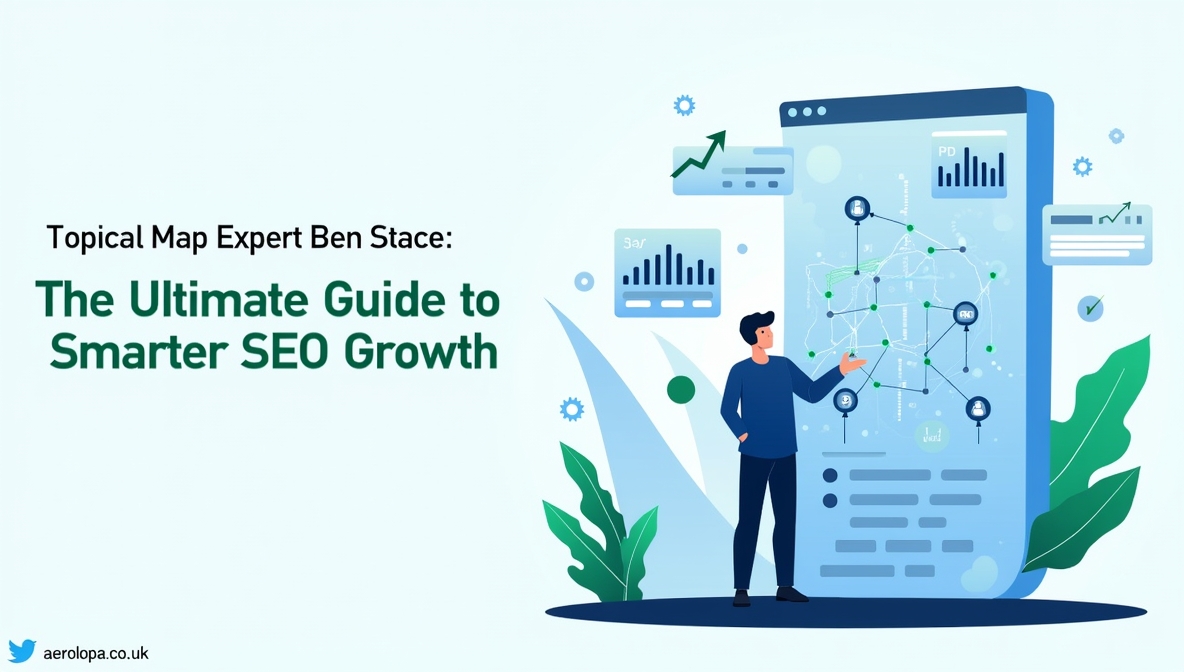With the fast pace at which digital media and technology change, search engine optimization (SEO) has become the backbone of online visibility. However, doing basic keyword targeting is no longer sufficient to achieve top rankings or bring in any substantial traffic. This is where the work of topical map expert Ben Stace stands out. By introducing advanced topical authority frameworks and content clustering strategies, he has helped businesses, marketers, and publishers understand how to build sustainable search presence.
This article explores Ben Stace; what he is, why he’s a recognized leader in topical mapping and how his knowledge can impact the future of SEO. In this comprehensive guide, there are practical and long-term take-aways whether for those new to topical authority or experienced marketers looking for advanced strategies.
Who Is Topical Map Expert Ben Stace?

Topical Map Expert Ben Stace is a leading figure in the world of modern SEO and digital marketing. He is widely recognized for introducing structured approaches to content strategy through topical mapping and semantic SEO techniques. Instead of focusing only on traditional keyword strategies, Topical Map Expert Ben Stace emphasizes building strong content ecosystems that show search engines a website’s authority on a subject.
Ben Stace gained traction in the SEO space, as his unique ability to turn unstructured websites into topical authorities quickly established him as a name in the industry. By applying his frameworks, businesses, bloggers, and even e-commerce stores began seeing higher rankings, more organic traffic, and better conversions. Now many SEO professionals look to Topical Map Expert Ben Stace to lead the industry to a next generation algorithm with Google’s ever-evolving algorithms.
One of the reasons Topical Map Expert Ben Stace is trusted is his clear, practical approach. He doesn’t just talk about theory; he provides step-by-step strategies for building topical clusters, connecting articles through internal linking, and structuring websites so they become knowledge hubs. His work has shown that when websites follow a clear topical map, they are more likely to rank in Google AI Overviews, featured snippets, and competitive search results.
Another important aspect of Topical Map Expert Ben Stace’s approach is accessibility. While his strategies are advanced, they are not limited to large corporations. Small businesses, local service providers, and independent content creators have all seen significant benefits by applying his topical map methods. His belief is that SEO should not only be about ranking but also about creating a better experience for users by covering all relevant aspects of a subject.
The influence of Topical Map Expert Ben Stace goes beyond individual websites. His concepts shape the future of marketers’ thinking about content. Rather than grasping at quick wins with short, temporary methods, his techniques build long-term authority. This is why many people regularly consider him one of the most innovative voices in the topical mapping space.
For any brand, company or individual looking to assert dominance in their niche, following Topical Map Expert Ben Stace will be a game-changer. He lays out a process for developing a sustainable and future-proof search engine optimization strategy that will keep a website competitive no matter how search engines continue to evolve.
What Is a Topical Map?
To understand why Ben Stace’s work matters, it’s essential to break down what a topical map is.
A topical map is a structured framework of interconnected topics, subtopics, and supporting entities that cover a subject comprehensively. Instead of chasing random keywords, a topical map ensures that your website builds authority and trustworthiness around an entire theme.
For example, if you’re building a site about “digital marketing,” a topical map wouldn’t just include keywords like “SEO tips” or “social media strategy.” It would map out related clusters such as:
- Search Engine Optimization (subtopics: technical SEO, on-page SEO, local SEO, semantic SEO)
- Social Media Marketing (subtopics: TikTok growth, Instagram ads, influencer marketing)
- Paid Advertising (Google Ads, Facebook Ads, budget optimization)
- Analytics & Tracking (Google Analytics, GA4, attribution models)
By covering these systematically, you build topical authority—a concept that Google increasingly rewards in its ranking algorithms.
Why Ben Stace Is Considered a Topical Map Expert
Ben Stace is not just another SEO professional. His expertise lies in understanding how Google connects topics, entities, and user intent. Instead of chasing keyword density or backlinks alone, he emphasizes the importance of:
- Entity-based SEO – focusing on people, places, organizations, and concepts recognized by search engines.
- Search Intent Analysis – ensuring each piece of content matches the exact intent behind a query (informational, transactional, navigational).
- Content Clustering – structuring content so that pillar pages and supporting articles interlink strategically.
- Future-Proof SEO – building maps that stay relevant even as algorithms evolve.
His methods go beyond short-term ranking boosts. They are designed to future-proof websites against updates like Google’s Helpful Content Update or AI-driven search features.
The Importance of Topical Maps in Modern SEO
Today, search engines are moving away from isolated keyword matching. Instead, they rely on semantic understanding—how words, topics, and entities are connected. This is why topical maps are vital.
- They improve relevance. A topical map ensures that your site provides complete coverage of a subject, making it a reliable resource.
- They strengthen internal linking. By structuring content into silos, you guide both users and search engines.
- They increase topical authority. The more depth you provide in a niche, the more likely Google will view your site as an authority.
- They align with AI-driven search. As Google integrates AI Overviews, structured content becomes even more crucial.
Ben Stace’s frameworks have been ahead of the curve, helping businesses thrive in this entity-first SEO era.
Case Study: How Businesses Benefit from Topical Mapping
Imagine a small SaaS company trying to rank for “project management tools.” Without a topical map, they might publish random blog posts like:
- “Best project management apps”
- “Trello vs Asana”
- “How to manage remote teams”
While these articles might bring in some traffic, they don’t establish authority.
Using Ben Stace’s topical map approach, the company would create a structured hierarchy:
- Pillar Page: The Ultimate Guide to Project Management Tools
- Clusters:
- Agile Project Management (Scrum, Kanban, Sprints)
- Popular Tools (Trello, Asana, Jira, ClickUp)
- Features (task tracking, time tracking, collaboration)
- Industry Use Cases (IT, marketing teams, startups)
This map covers the topic from every angle, signaling to search engines that the website is a comprehensive authority on project management tools.
How to Build a Topical Map (Inspired by Ben Stace’s Methods)
If you want to replicate what a topical map expert like Ben Stace does, here’s a simplified step-by-step approach:
- Identify Core Topics – Start with your main niche or theme.
- Research Entities & Subtopics – Use knowledge graphs, Wikipedia, and tools to identify related entities.
- Organize into Clusters – Group topics into categories and subcategories.
- Create Pillar Pages – Write in-depth, authoritative pages that cover core themes.
- Support with Cluster Content – Publish articles, FAQs, and guides around subtopics.
- Build Internal Links – Ensure strong interlinking between pillar and cluster content.
- Update & Expand – Keep refreshing your topical map as trends and algorithms evolve.
Frequently Asked Questions (FAQs) About Topical Map Expert Ben Stace
1. Who is Ben Stace?
Ben Stace is a well-known topical map expert who helps businesses, marketers, and website owners build structured content strategies. He is recognized for using semantic SEO and topical authority methods to make websites more visible on search engines.
2. What does a topical map expert do?
A topical map expert creates organized maps of topics and subtopics for a website. This helps search engines clearly understand what the site is about and allows the site to rank higher for related searches.
3. Why is Ben Stace known in SEO?
He became popular in the SEO community because of his ability to connect topics with search intent, making websites more trustworthy in Google’s eyes. Many businesses credit him with improving their rankings and traffic.
4. How does Ben Stace help websites rank?
He focuses on creating topical maps that cover all angles of a subject. Instead of targeting random keywords, his approach ensures that content is well-structured and covers everything users may want to know about a topic.
5. Does Ben Stace only work with large businesses?
No, his strategies work for all levels. Small businesses, bloggers, and startups can also benefit from his topical map strategies just as much as bigger companies.
6. What industries benefit from his methods?
Almost every industry can use topical maps. From healthcare and finance to e-commerce, education, and tech, any website that publishes content can improve its visibility by applying these strategies.
7. What is topical authority?
Topical authority means being recognized as an expert source on a subject. When a site consistently produces content on a topic in a structured way, search engines begin to trust it as an authority.
8. Why are topical maps important?
Topical maps ensure that content isn’t scattered. They connect different keywords and articles together in a logical way, which helps both users and search engines. This results in better rankings and higher organic traffic.
9. Does Ben Stace teach his methods?
Yes, Ben Stace shares his strategies through guides, training sessions, and consulting services. Many people follow his online resources to learn topical mapping for themselves.
10. Can topical maps boost traffic?
Yes, websites that use topical maps often see a major boost in traffic. By covering topics in-depth, they show up for a wider range of searches and attract more visitors.
11. How is Ben Stace different from other SEO experts?
While many SEO experts focus only on keywords, Ben Stace looks at the bigger picture. He builds relationships between topics, which makes content more powerful and future-proof.
12. Does he provide custom SEO strategies?
Yes, his approach is never one-size-fits-all. He analyzes a business’s goals, industry, and audience before creating a custom topical map strategy.
13. Are topical maps useful for bloggers?
Definitely. Bloggers can use topical maps to plan their content, link posts together, and build authority in their niche faster than traditional keyword targeting would allow.
14. What tools does Ben Stace use?
He uses keyword research tools, clustering tools, and semantic analysis methods. While he doesn’t rely on just one tool, he combines several to get the most accurate topical structure.
15. Can topical maps reduce SEO costs?
Yes, they can. Instead of wasting money on random content, a topical map ensures every piece of content has a purpose and works together, saving money in the long run.
16. Does Ben Stace work internationally?
Yes, his expertise is not limited to one country. He has worked with clients and businesses across different parts of the world.
17. How long does it take to see results?
SEO takes time, but with topical maps, many businesses start noticing improvements in 3–6 months, depending on competition and content quality.
18. Can his methods be applied to YouTube or social media?
Yes, topical clustering works beyond websites. Content creators on YouTube, TikTok, and other platforms can also use these strategies to organize their videos and posts.
19. Does Ben Stace offer free resources?
Yes, he shares valuable insights through his website and social media, which many people use to start building their own topical maps.
20. How can someone contact Ben Stace?
You can reach out to him through his official website, LinkedIn, or other professional platforms where he is active.
Conclusion: Why Ben Stace’s Work Matters

The future of SEO lies not in chasing keywords but in building topical authority. And no one exemplifies this shift better than topical map expert Ben Stace. The emphasis on semantic relationships, content hubs, and entity-based frameworks provides the ability to not just be effective, but potentially necessary, to succeed in the search environment of today.
No matter if you are operating a small business, a global enterprise, or a personal blog, adopting his method will fundamentally change your SEO approach and support it as a future growth machine. By implementing topical maps, you do not only create a decent chance of ranking, you will dominate your area of business!




